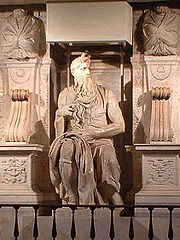扫罗王
中文简介
扫罗王是以色列联合王国的第一位君主,亦标志着士师时代的结束。他是撒母耳
因应以色列人要求有一位自己的君主的呼声,在向上帝请示过以后,根据上帝的旨意而膏立的。他是便雅悯支族的后人,是一位大能的勇士的儿子,所以在以色列甚有声望。是以色列犹太人进入王国时期的第一个王,公元前1020—前1000年在位。在位期间建立了一支强大的军队,与腓力斯丁人作战并取得了胜利,一定程度上促进了以色列犹太民族的统一。但是他在犹太部落中不受欢迎,因此取得的成就有限,最终因为犹太人领袖大卫的背叛而死于与腓力斯丁人的战斗之中。他死后以色列实力大为削弱,为犹太人大卫称王提供了条件。
因应以色列人要求有一位自己的君主的呼声,在向上帝请示过以后,根据上帝的旨意而膏立的。他是便雅悯支族的后人,是一位大能的勇士的儿子,所以在以色列甚有声望。是以色列犹太人进入王国时期的第一个王,公元前1020—前1000年在位。在位期间建立了一支强大的军队,与腓力斯丁人作战并取得了胜利,一定程度上促进了以色列犹太民族的统一。但是他在犹太部落中不受欢迎,因此取得的成就有限,最终因为犹太人领袖大卫的背叛而死于与腓力斯丁人的战斗之中。他死后以色列实力大为削弱,为犹太人大卫称王提供了条件。
House of Saul
According to the Tanakh, Saul was the son of Kish, of the family of the Matrites, and a member of the tribe of Benjamin, one of the twelve Tribes of Israel. (1 Samuel 9:1-2; 10:21; 14:51; Acts 13:21) It appears that he came from Gibeah.
Saul married Ahinoam, daughter of Ahimaaz. They had four sons and two daughters. The sons were Jonathan, Abinadab, Malchishua and Ish-bosheth. Their daughters were named Merab and Michal.
Saul also had a concubine named Rizpah, daughter of Aiah. They had two sons, Armoni and Mephibosheth. (2 Samuel 21:8)
Saul offered Merab to David as wife after his victory over Goliath, but David does not seem to have been interested in the arrangement. (1 Samuel 18:17-19) Saul then gave his other daughter Michal in marriage to David, (1 Samuel 18:20-27) but when David became Saul's rival to the kingship of Israel, Saul gave Michal in marriage to Palti, son of Laish. (1 Samuel 25:44)
Saul killed himself at the Battle of Mount Gilboa (1 Samuel 31:3-6; 1 Chronicles 10:3-6), and was buried in Zelah, in the region of Benjamin in modern-day Israel. (2 Samuel 21:14)
Ish-bosheth and Mephibosheth
Three of Saul's sons – Jonathan, and Abinadab, and Malchishua – died with him at Mount Gilboa (1 Samuel 31:2; 1 Chronicles 10:2). Ish-bosheth became king of Israel, at the age of forty. (2 Samuel 2:10) Michal was returned as wife to David.
Ish-bosheth reigned for two years and was killed by two of his own captains. (2 Samuel 4:5) Armoni and Mephibosheth were given by David along with the five sons of Merab (Saul's daughter) to the Gibeonites, who killed them. (2 Samuel 21:8-9) Michal was childless. (2 Samuel 6:23)
The only male descendant of Saul to survive was Mephibosheth, Jonathan's son, (2 Samuel 4:4) who had been five when his father and grandfather Saul had died in battle. In time, he came under the protection of David. (2 Samuel 9:7-13) Mephibosheth had a young son, Micah, (2 Samuel 9:12) of whom nothing more is heard.
Anointed as king
"Death of King Saul", 1848 by Elie Marcuse (Germany and France, 1817-1902)
Samuel, the Judge, had sons who were dishonest and not trustworthy of the faith. The leaders of the Israelites feared that it would be disastrous if his sons were to be judge over them and request that Samuel give them a king. God warns that if he appoints a king over them, they will suffer the dealings of the king. Saul (Talut), a young Israelite, was commanded by his father, Kish, to go and locate their lost donkeys. Saul obeys and Samuel sees him walking toward him. God reveals to Samuel that Saul will be the one to be anointed as the "first" King of Israel. Peter J. Leithart observes:
Saul, the first king, begins as an ideal choice to lead and judge Israel ... Saul cares for his father's animals (as did Joseph and Moses, and as David will), and he is a dutiful son ... Saul is a handsome man and a head taller than any Israelite (1 Samuel 9:2)
In the Books of Samuel, Saul is not referred to as a king (melech), but rather as a “leader” or “commander” (nagid) (1 Samuel 9:16; 1 Samuel 10:1).However (possibly representing an opposing literary strain[citation needed]), Saul is said to be made a "king" (melech) at Gilgal (1 Samuel 11:15). Even David, before he was anointed king, was referred to only as a future nagid, or military commander (1 Samuel 13:14).
The people generally used the term “king,” because their desire was to be like the other nations (1 Samuel 8:5; 10:19). This may be indicative of the difference between what a certain faction of the people wanted, and a definite reluctance of certain leaders (e.g., the prophet Samuel) to break from the old tribal order: viz., an attempt to satisfy everyone without creating a riot. But Saul was finally crowned as "king" (melech) in Gilgal. (1 Samuel 11:14-12:2)
The Books of Samuel give three events in Saul's rise to the throne:
(1 Samuel 9:1-10:16) Saul was sent with a servant to look for his father's donkeys, who had strayed; leaving his home at Gibeah, they eventually wander to the district of Zuph, at which point Saul suggests abandoning their search. Saul's servant however, remarks that they happened to be near the town of Ramah, where a famous seer was located, and suggested that they should consult him first. The seer (later identified by the text as Samuel), having previously had a vision instructing him to do so, offers hospitality to Saul when he enters Ramah, and later anoints him in private.
(1 Samuel 10:17-24 and 12:1-5) Desiring to be like other nations, there was a popular movement to establish a centralised monarchy. Samuel therefore assembled the people at Mizpah in Benjamin, and despite having strong reservations, which he made no attempt to hide, allows the appointment of a king. Samuel uses cleromancy to determine who it was that God desired to be the king, whittling the assembly down into ever smaller groups until Saul is finally identified. Saul, hiding in baggage, is then publicly affirmed.
(1 Samuel 11:1-11 and 11:15) The Ammonites, led by Nahash, lay siege to Jabesh-Gilead, who are forced to surrender. Under the terms of surrender, the occupants of the city would be forced into slavery, and have their right eyes removed as a sign of this. The city's occupants send out word of this to the other tribes of Israel, and the tribes west of the Jordan assemble an army under the leadership of Saul. Saul leads the army to victory against the Ammonites, and, in both gratitude and appreciation of military skill, the people congregate at Gilgal, and acclaim Saul as king.

